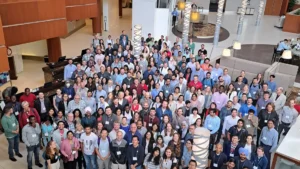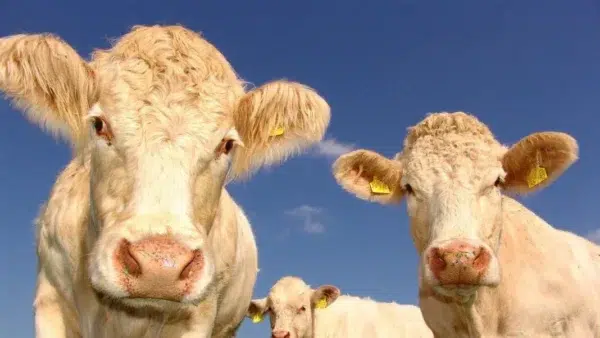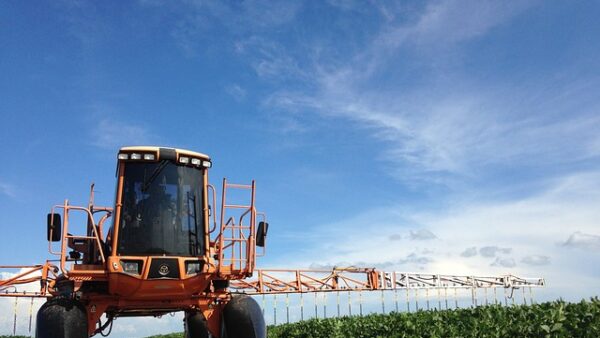For these giants of the global seed business, good leadership means investing in the next generation, creating community and striving for new innovations.
There are a multitude of aspects that go into leadership, but what makes a so-called ‘great leader’ in the agriculture industry?
A sign of a good leader is the willingness to advocate for change, however difficult it might seem to push against the normal ebb and flow of how a company or organization has systematically done things. One who is willing to invest in the industry and its professionals and looks towards the future.
Take Hannah Senior, the National Association for Plant Breeding (NAPB)’s new president, for example. Senior took the role this past August, dedicating herself to the growth and betterment of the organization. Despite record membership levels, Senior believes that there is still much work to be done.
“As with all organizations as they grow, the needs change and growing pains can occur. We’re reaching that point now where we need to put some structure in place to help the organization go from its young roots, to being an organization that can continue to grow,” says Senior.
NAPB works to connect plant breeders across crops and geographies, communicating the importance of plant breeding. Not only do they invest in their older generation of members, but they also put a strong emphasis on the upcoming generation of leaders with various awards and scholarships.
“NAPB brings this huge energy around the student community and encouraging more people who are going through their education to think about plant breeding as a career path and understand what that might look like and get involved. We’ve really seen with the Borlaug scholars and the George Washington Carver scholars and other programs that we’ve been able to inject some energy into that that cause as well,” she explains.
The George Washington Carver scholarship offers students who have historically been excluded and are underrepresented the chance to feel more connected to NAPB and its community of plant breeders, paving the path for a more diverse future for the agricultural community.
Diversity and inclusivity are two of the values Senior keeps at the top of her list.
“NAPB takes the importance and the value of diversity very seriously. Perhaps, as plant breeders, we should do that, because we really understand the importance of genetic diversity. But it’s like putting that human diversity into our organization and into our profession,” Senior adds.
The current leaders of the industry are excited by the passion they see in the young men and women who are early in their careers to find solutions for issues not only on a national scale, but a global one.
According to the United Nations International Labor Organization (ILO), the percentage of people who work in agriculture has dropped from 44% in 1991 to an all-time low of 26% in 2020. The percentage of the North American workforce in agriculture has dropped drastically over the years, from 70% in the year 1840 to around three percent by 2000 in the U.S. alone, according to USDA statistics.
That’s why meetings, such as NAPB’s 2022 Annual Meeting this past August in Ames, Iowa, are so essential to promote growth and collaboration, bringing young scholars and seed industry veterans together to work towards a common goal.
These face-to-face events also offer the next generation of industry professionals the opportunity to network with members who are eager to share their wisdom and advice. By providing learning and networking opportunities to college students, the likelihood increases that those students might pursue a career in the seed industry, according to Jeff Skemp, client operations manager for Gro Alliance and chair of the Independent Professional Seed Association’s (IPSA) education committee.
IPSA’s education committee focuses mainly on scholarships, awarding 10 $2,000 scholarships per year. In addition to the scholarship money, the students awarded are given the opportunity to attend the NAPB conference with their meals and transportation free of charge. Each student is paired with a mentor to directly connect them with members and act as a resource throughout the conference.
“They are young, and hopefully this conference, their mentors and getting introduced to the IPSA membership opens a lot of doors for them,” says Skemp. “I would encourage them to use this experience and the networking that they’re doing here to keep pushing those doors open for several years, and for the rest of their career, to see what opportunities lie behind the door and use that networking to the best of their abilities to further themselves in their careers.”
The Push for Innovation
While advocating for change and implementing new initiatives can greatly benefit the industry, it is not always easy. Among the ongoing issues in the industry, whether they are regulatory issues, state issues or international issues, the hindrance of innovation is one of the greatest, according to Andy LaVigne, president and CEO of the American Seed Trade Association (ASTA).
“The biggest issue that we’re dealing with today is that the pace of innovation is outpacing the ability of the federal government to monitor it, develop policy or regulation and to ensure that they’re comfortable with it,” explains LaVigne. “The further and further we get along with our plant breeding evolution, discovery and innovation, the slower the government gets. That starts to hinder our discovery and the ability to implement it. As we look at climate change, everyone says it is gradual. Well, government policy and understanding are even slower. That’s not good for innovation, especially as quickly as we need it. Especially as quickly as growth is expected.”
As a leader, push back is inevitable. It’s how someone handles the obstacles and challenges that are thrown at them that proves the kind of leader they truly are. For someone like LaVigne, his strength lies in getting the decision makers around the table to cooperate by prioritizing collaboration.
“You bring the people around the table who can help you find a solution. And you don’t start with what you disagree on. You start with what you agree on and what the goal is. It’s not about ASTA getting credit, it’s about the seed industry getting credit. It’s about the grower getting credit and having new products,” says LaVigne.
LaVigne was recently presented with the NAPB Friends of Plant Breeding Award. This award honors people whose career may or may not have been involved in plant breeding, but who through their professional activities and passion have contributed significantly to the plant breeding discipline. The award acts as a testament to LaVigne’s leadership capabilities and power to bring the community together amidst similarities and differences.
LaVigne continues to champion change, highlighting the increasing issues across the world that he believes the industry can join forces to combat.
“What I love to talk about with this group is we have a responsibility as an industry. Yes, we sit here in the U.S., a very comfortable country, and are able to feed ourselves, but there are a lot of people in the world that can’t and rely on countries like the U.S. and Europe to find solutions to their issues,” he explains. “That’s where the plant breeding community comes in. When I talk about plant breeding, my passion is deeper than just seeds. That’s who pays the bills and who employs me, but it’s plant breeding. It’s the trees, vines, and bushes. It’s plant breeding, and how to get that discovery out there.”
Leaders Step Up to the Challenge
Leadership skills come naturally to some, but not all who step up and lead are seeking out that responsibility, sometimes, it just finds them. Quality leadership takes learning from mistakes and improving for the betterment of the company and staff. Don Blackburn, retired NA regional crops and global breeding services lead for Corteva Agriscience, is a living testament to this.
Originally a plant breeder, Blackburn’s engagement and influence go well beyond the breeding community. He was hired out of breeding and instantly put in charge of creating a brand-new station during a merger between Dow AgriSciences and DuPont Pioneer, with no training on how to be a successful leader to his new team looking to him for guidance.
“I had tremendous staff, and I took that extremely seriously. In fact, I was hired straight out of plant breeding and put in charge of creating a brand-new station. I did that, and within one year, I had land, a building and I hired my first staff. And I found out that I was not a very good people leader,” says Blackburn. “I took that very seriously and took that harshly. I was just so much of a micromanager in those days. You can tend to suffocate your staff. And I worked on that. I began treating my staff much better. We had very successful early years, and I always remembered that throughout my career.”
It might have been a rocky beginning, but Blackburn knew that the only way for him to be triumphant was to keep moving forward amid change.
“I had no choice. What I found in my career is when you don’t have any choice, you need to just go after it,” he explains. “It was a tremendous effort. Not simple, but it was great to get to the finish line and get to the finished product.”
Clearly no stranger to significant changes, Blackburn advises those who are not so keen on company or organization shifts to embrace their feelings of nostalgia.
“There’s no problem with being nostalgic. You need to be proud, and I was certainly proud of what we had done at Dow AgroSciences,” he adds.
A mentor to many, Blackburn was recently awarded the NAPB Lifetime Achievement Award. This honor highlights an individual who has offered long-term services to the plant breeding community in areas including research, education, extension outreach and leadership.
Blackburn’s secret to being a good mentor? Soaking up the knowledge and advice from his past mentors.
“I had great mentors in my career. When you have great mentors, and you really, truly listen to the advice you get from them, you can’t help but to have it rub off on you and you’ll learn how to be a good mentor,” he says. “An important part of leadership is following the golden rule. Just treat people as you think they would want to be treated. And if you do that, you can become a very good mentor to really anybody.”
For these four giants, Senior, Skemp, LaVigne and Blackburn, the bigger picture is much more important than the recognition for their outstanding leadership.
Read more about leadership at:
When Working with Authority, Use with Care
For Tar Spot, Seed Choice is Imperative: Q&A with Peter Lynch













